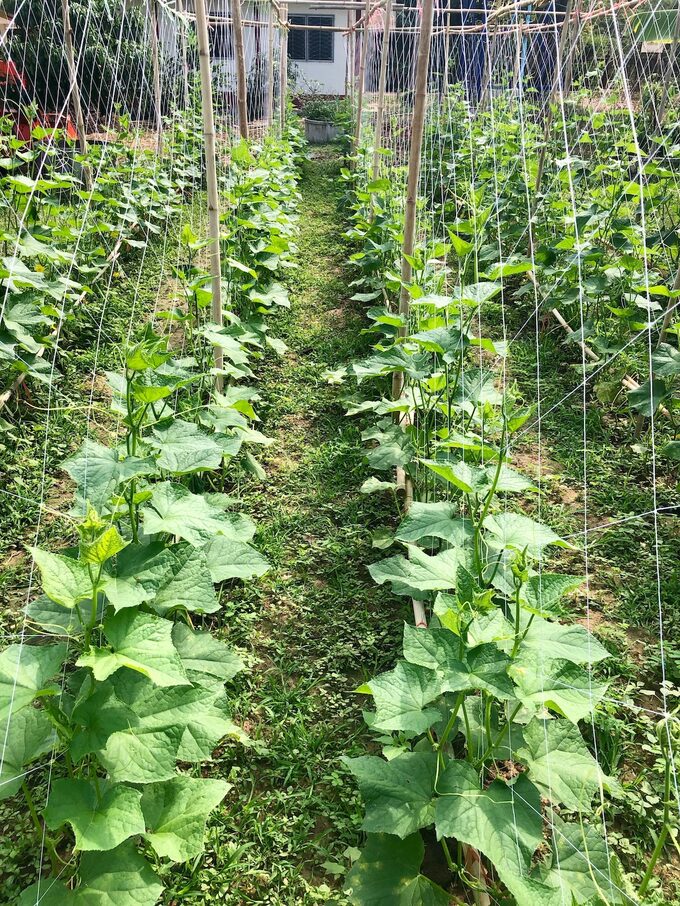
As Sarnelli House hits its 20th year, we hope that all our building is done. We have had two construction projects in the past few years. One was forced upon us when we had to urgently relocate our house for junior high school girls as their existing premises was no longer safe. This was aa a result of a government road widening scheme. The other building took place on a 12 rai (4.7 acres) parcel of land we owned about 3 kilometres from the rest of the farm. A retirement home for Fr. Mike was built, alongside two bungalows for some of our older kids, who would become part of our staff. These are young adults who struggled academically but were keen to learn agricultural skills and the bungalow allowed them to take a first step towards independence. A young family came to live in one of the bungalows. The family is made up of a very sweet and considerate Sarnelli House girl, her husband and their little boy. She had come to Sarnelli House as a child, having been violently run out of Udon Thani because she was born with HIV. Her husband and child are HIV free. They are a wonderful family and have become valued members of staff.


The land contains rice field, a fish pond and now, a new fruit and vegetable garden. The garden project is overseen by Ms. Peh, who has been with Fr. Mike from the very beginning of Sarnelli House. She spent the first few years looking after the children living with HIV and she was the primary carer for the children who we lost to the virus. Later on, Ms. Peh took over our House of Hope nursery and ran it with love and kindness. Many of our current crop of junior and senior high school teenagers took their first Sarnelli House steps under her loving care and they are all better for it. Ms. Peh took some time off a few years ago, as she hadn’t had a break for almost 20 years and was worn out. She has always been an amazing gardener and recharged by spending time developing fruit trees, herbs and vegetables plants around her home.


Now Ms. Peh is applying her green fingered expertise to the garden at the 12 rai. Most of the land is taken up by paddy fields for rice and the Irish Aid program gave money for papaya, banana and mango trees a few years ago, but that left a good chunk of space for further development. Ms. Peh has built an amazing garden there, growing a range of vegetables for the Sarnelli House kitchens. She is growing cabbage, lettuce, Thai basil, Thai celery, tomatoes, corn, long beans and sunflowers. With seeds from the USA, Swiss chard, squash and zucchini have been planted as well. Ms. Peh uses every available inch and has even been exploring hydroponic growing techniques, growing lettuce, celery and cabbage successfully using these methods. One of the boys living at the 12 rai has become a very willing student and the two of them work contentedly among the vines for hours every day, weeding, pruning and planting. No pesticides or chemical whatsoever are being used.


Ms. Peh is using years of knowledge and learning to develop this garden. She sits peacefully, transferring seeds and seedlings with a tweezers from a small container to a bigger one, then erecting a bamboo frame for a vine, and moving onto the watering or trimming a row of cabbages. What she doesn’t know instinctively, she looks up online and adapts what she has read to her needs. She also draws on the knowledge of one of our university students who is studying horticulture and is a great support to this project. Ms. Peh has installed two solar panels for the pumps to reduce the costs and she is now planning on building a greenhouse in the remaining space. This, and some plastic roofing, will allow her to continue the project during the rainy season. All produce grown on the land will be served to the children. The kitchens will buy from Ms. Peh, at a lower rate than at the market, and then she can reinvest the money into the garden. There is a possibility to expand into one of the paddy fields but that decision will be taken next year.



This new garden project fits in with Sarnelli House’s drive to become more self-sustainable. Should the solar panel prove worthwhile, we will explore the possibility of using them elsewhere around the houses. And we have already reduced out energy costs by switching to LCD lightbulbs. We mix cow manure with leaves and husks from the milled rice to make our own fertiliser, and we are looking at centralising our purchasing and using our vehicles more efficiently. This is all on top of the development of Jomp’s farm, which allows us to grow our own rice and raise pigs, ducks and fish.



